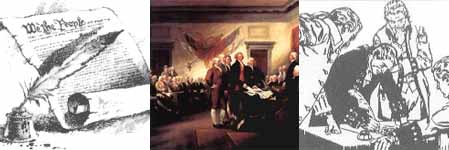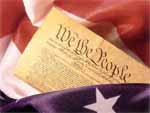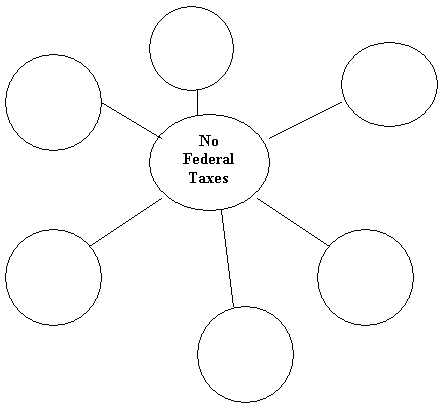Activity 2
Essential Questions
- How do taxes transfer resources from private to public use?
Background
In 1781 in an attempt to establish a new government after the Revolutionary War, the former colonists adopted the Articles of Confederation. Because the Americans thought that they were taxed excessively by the government of King George III, they were hesitant to grant much economic power to the central government .The Articles of Confederation thus provided for a weak central government.

By 1781, all of the states had adopted the Articles of Confederation. However, Americans began to recognize the problems created by The Articles of Confederation. Under the Articles, the Continental Congress could establish a postal service, regulate the currency, and borrow money. It could not regulate interstate or foreign commerce, levy taxes, or enforce its laws because it contained no provision for an executive or federal judiciary. In 1787, during the Philadelphia Convention, a new Constitution was written to address these problems.
Instructional Strategies
 |
Strategy 1 |
Graphic Organizer
Ask students to think about everything they have done over the past few days. Record their answers on the board. Answers could include: showered, dressed, eat meals, listened to the weather report from a government weather center, rode on a school bus, attended school, visited a local park, traveled on a public road, crossed a bridge, attended a sporting event, went to a movie, played video games, read a book, mailed a letter, went to the store.Ask students to identify which of the activities listed were provided by or made possible because of government. Put a star by these items.
Talk about our early efforts to establish a government. Review your list on the board and talk about those services that the framers of the Articles of Confederation would want their government to provide, such as a postal system and a sound currency so that they could buy the things they needed.
Guide the discussion to include services governments provide, which might not be on their list. Use good questioning skills to guide your discussion:
- How was trade regulated between the states and with foreign governments? Why is this an important function of government?
- What happened to people who broke the law? Why is this an important function of government?
Review your list on the board again. Put an X by those items that you like to do but can't do too often because they cost money.
- Why do people charge for these things?
- Why don't you have to pay for some of the things on your list that the government provides? Who pays to provide these services?
- Can a government provide these services if people don't pay taxes?
Work with a partner to complete the web. Create a web using the diagram below as a starting point. In the center circle are the words, "No Federal Taxes." Identify things that citizens would do without if there were no federal taxes. Be prepared to share your web with the rest of the class. Add more lines and circles as needed.
Talk about why these are important services that people have come to expect from their government.
Read the following paragraph to the students.
 Score Guide
Score Guide
 |
Strategy 2 |
Graphic Organizer
Explain that just as businesses use resources to provide goods and services in the marketplace, the federal government uses resources to provide public goods and services. Have students construct a bulletin board with the following headings:
- Natural Resources - "gifts of nature" found in or on the earth
- Human Resources - people working
- Capital Resources - things produced by people and used to produce other goods and services
Provide students with a list of economic powers given to the government by the United States Constitution (Article 1, Section 8.). Have students use the table below to write powers assigned to the federal government in the first column of the table. Then group members should consider the resources required if the government wants to enact this power. For example, in order to collect taxes, the government would need tax collectors, customs inspectors, buildings, and record keeping supplies.
Power Granted |
Resources |
Do you think private business and government might compete to provide the same services using the same resources? Would this be a problem? Explain.
 Score Guide
Score Guide
 |
Strategy 3 |
Concept Development
Define opportunity cost with the students. Have students read the paragraph below prior to the discussion
Opportunity Cost is the economic term used to identify what has been given up when a choice is made. If cotton, sewing machines, workers, and other resources are used to produce military uniforms, those same resources can no longer be used to produce jeans. If young people are enlisted in the armed services, they are not available in the labor force to produce other goods and services. The opportunity costs of having young people in the military are the private goods and services that will not be produced.
Discussion Questions:
- How does the government get paid for the goods and services it provides?
- How does this sift resources from private use to government use?
Directions: Column one is a list of events that occurred after the adoption of the Constitution. You are to read each event in column one, identify the resource(s) that shifted to public use in Column 2, and possible private good(s) or service(s) that may have been given up in column 3. An example is provided.
|
Event
|
Resource
|
Opportunity Cost
|
| More people find jobs building new post roads. | Workers |
Construction of houses |
| The U. S. Army orders more uniforms. |
|
|
| The government decides to build canals for trade and transportation. |
|
|
| Tax collectors are hired by the government to collect taxes and enforce laws. |
|
|
| Customs houses are built in ports for inspection of imported goods and collection of duties. |
|
|
| The government decides to start a navy. |
|
Why are some people concerned that the government is trying to provide too many goods and services? Should there be a limit on the size of government and the services it provides?
 Score Guide
Score Guide

 Module Menu
Module Menu Printable View
Printable View

